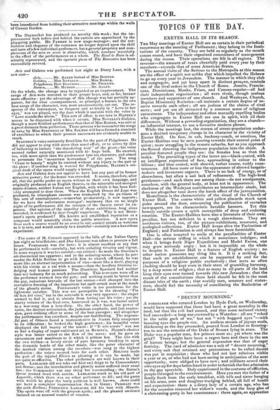- The name of M. COULON appeared in the hills
of the Italian Opera last night as beneficiaire ; and Don Giovanni was taken to procure a full house. FORNASARI was the hero: it is almost needless to say that he performed it well—carefully, but with unfailing vivacity and vigour. In some respects it was too careful—too critical : he made the libertine's art-theoretical too apparent ; and in the seducing-scene, where he per- suades the fickle Zerlina to go with him to church off-hand, he was more like an abstract impersonation of vice—more like a devil, playing with his victim as a cat with a mouse—than the heedless libertine in- dulging real human passions. The illustrious Spaniard had neither time nor industry for so much painstaking. This over-care wore off as the performer warmed into the part ; and nothing could be better than the gay, audacious bravado of the last scenes—well changed into the convalsive freezing of the impenitent but spell-struck man at the touch of the ghostly statue. FORNASARI'S voice is too ponderous for the lightsome cavalier. This was not perceptible in the shouting "Fin eh' ban dal vino," but in the serenade it was very apparent : the singer seemed to feel it, and to abstain from letting out his voice ; yet the sturdy volume of the final note, humoured as It was, was better suited to a war-song than a love-ditty. On the other hand, the power of voice, the distinct articulation, the judicious emphasis, and just expres- sion, gave striking effect to some of the best passages ; and altogether the performance was excellent, despite our faultfinding. The ungrate- ,ful part of Ottavio found a representative in MAnto fully competent to its difficulties : be looked the high gentleman ; his beautiful voice displayed the full beauty of the music : if "II mio tesoro " was not so fine a display of super-cultivated art as RumNis, MARIO'S chaster style was better suited to the flow of the notes; and he gave an earnestness and manliness to it which it seldom has. The trio with the two trebles—a lovely strain of pure harmony breaking in upon the dramatic bustle of the other music, like the purer character of the masked visiters among the revellers—was sung in the highest perfection : the voices seemed born for each other. MOLTINI made the part of the injured Elvira as pleasing as it can be made, but not quite so effective. The other performers are well known in their parts. LABLACHE did not take our hint and deign to he Comntendatore and Statue ; and the introduction and ghostly music suffered their usual fate : the Commander was any thing but commanding ; the Statue's throat seemed lined with cotton. LABLACHE stuck to his old part of Leporello, which there was no other performer to fill ; and the gusto with which he plays the burly poltroon is well known. Anna could not have a completer impersonation then in Gann ; PERSIANI was the arch Zer/ina ; FREDERICK LABLACHE did his best with Alasetto. The opera went off with the greatest spirit ; and the pleased audience insisted on an unusual number of encores.


























 Previous page
Previous page